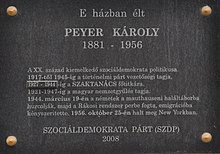Károly Peyer
Károly Peyer (born May 9, 1881 in Városlőd , Austria-Hungary ; died October 25, 1956 in New York City ) was a Hungarian trade unionist and social democratic politician.
Life
Károly Peyer was an iron worker and has been involved in the trade union movement since his youth. In 1906 he became a union secretary and employee of a workers' compensation insurance company. He became a member of the Social Democratic Party of Hungary and was a member of the party executive since 1911. From 1918 he was union secretary of the Mining and Steel Workers Union. After the establishment of the Hungarian Republic in 1918, he participated as a government commissioner in the disarming of the revolutionary Hungarian miners. During the Hungarian Soviet Republic , Peyer was the head of the Mining and Metallurgy Department of the People's Commissariat for Social Production. Shortly before the dissolution of the Soviet republic, Peyer became Minister of the Interior in the Gyula Peidl government for six days in August 1919 . He was then Minister for Labor and Social Affairs in the István Friedrich government and the government of Károly Huszár . On January 16, 1920 he fled to Austria and stayed there for a year.
After his return in 1921, he supported István Bethlen’s consolidation policy under the reign of Reich Administrator Miklos Horthy , which resulted in the so-called Bethlen-Peyer Pact in December 1921 . For this he was fought by Hungarian communists. He became a member of parliament in 1922 (until 1944) and from 1931 headed the Social Democrats.
From 1927 Peyer was general secretary of the Hungarian trade union council and was a delegate at the international labor conference. After the German occupation of Hungary in March 1944, Peyer and other politicians were deported to the Mauthausen concentration camp .
After the end of World War II, Peyer opposed the forced unification of the Hungarian workers' parties and was expelled from the MSZDP in 1947. In the Hungarian parliament he switched to the Radical Party (Magyar Radikális Párt). Peyer fled to Salzburg on November 19, 1947 and then went to the USA with his wife and daughter in 1948. In what was now communist Hungary, he was sentenced to eight years in prison in absentia. Peyer died during the events of the Hungarian uprising in 1956 , which he followed from afar.
Fonts (selection)
- Karl Peyer: The trade union and cooperative movement in Hungary: edited with the participation of the trade union leaders . Budapest: Union of Workers' Associations of Hungary, 1928
- A zsidókérdés igazi háttere . Budapest
- A X. genfi munkaügyi konferencia tárgyalásai és az olasz fascista mozgalom bírálata . Budapest: Népszava, 1927
literature
- István Simon: Vezéráldozat: a Peyer-kérdés és a magyar szociáldemokrácia . Budapest: Szazadveg, 2003 ISBN 963-9211-58-3
- László Réti: A Bethlen-Peyer paktum. Második, átdolgozott kiadás . Budapest, 1951
Web links
- Literature by and about Károly Peyer in the bibliographic database WorldCat
- Peyer Károly , at magyar-eletrajzi-lexikon
Individual evidence
- ↑ Ferenc Laczó: Hungarian Jews in the age of genocide: history of intellectual, 1929-1948 . Leiden: Brill, 2016, p. 138 ISBN 978-90-04-32464-0
- ↑ Károly Kókai: Hungarian waves of migration 1945–1963 , in: Csaba Szabó (Ed.): Austria and Hungary in the 20th Century , Vienna: Inst. Für Ungar. Historical research in Vienna, 2014, p. 247
| personal data | |
|---|---|
| SURNAME | Peyer, Károly |
| BRIEF DESCRIPTION | Hungarian politician |
| DATE OF BIRTH | May 9, 1881 |
| PLACE OF BIRTH | Városlőd |
| DATE OF DEATH | October 25, 1956 |
| Place of death | New York City |

